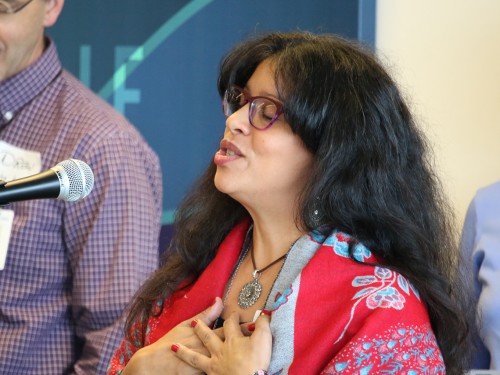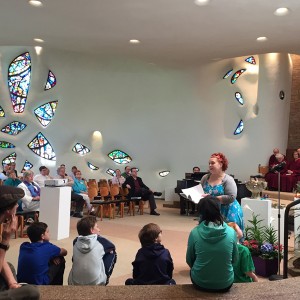Getting Proud: A Strategy for Liberation

[This sermon was given as part of the 2019 January Ingathering Worship service: Breakthroughs and Second Chances.]
I'll begin with a poem from Eduardo Galeano, a writer
Fleas dream of buying themselves a dog,
and the nobodies dream of escaping poverty:
that one magical day good luck will suddenly rain down on them; will rain down in buckets
But good luck doesn’t even fall in a fine drizzle, no matter how hard the nobodies summon it
The nobodies: nobody’s children, owners of nothing.
The
Who are not, but could be.
Who don’t speak languages, but dialects.
Who don’t have religions, but superstitions.
Who don’t create art, but handicrafts.
Who don’t have culture, but folklore.
Who are not human beings, but human
Who do not have faces, but arms.
Who do not have names, but
Who do not appear in the history of the world, but in the crime section of the
The nobodies, who are not worth the bullet that kills them.

I remember clearly the day I became a nobody here in the United States, which is different from being a nobody in your own country. It was the day I left Cuba with my family as political refugees. It was April 4, 1995, and I was 21 years old.
That day at the airport in Havana, when we came out of the terminal and onto the tarmac, the sun was so bright that I had to cup my hands around my eyes in order to see the rest of my extended family waving at us behind a barbed-wired fence far in the distance; armed soldiers standing between them and us.
I was nervous, but I still walked toward the plane with my Cuban-girl swagger, excited about the new adventure.
I was too young then to understand the losses that would follow, what being a nobody in this country would do to my spirit, to my sense of worth, to my dignity.
Last summer while doing chaplaincy training at a large hospital, during an on-call shift, at 3 a.m. as I walked along the corridors, I had a breakthrough moment. Because no one was watching me, I noticed I was walking differently; there was that enthusiastic Cuban-girl swagger. I realized I had been walking around—literally and figuratively—for over 20 years with an underlying anxiety about being inadequate about the way I talked, the way I dress, the way I learned, the way I knew what I knew; because they had been deemed inferior. My internalized oppression wasn’t just intellectual; it was embodied. Next day, I met with my CPE supervisor and I
“Girl, I need you to go out there and be BOLDER, and LOUDER, and PROUDER.” And so, that has become one of my practices of Liberation and Empowerment.
For any of you who need to get proud, I’ll close with an abbreviated version of a poem by Laura Hershey, who was a writer and disability-rights activist.
If you are not proud
For who you are, for what you say, for how you look;
If every time you stop
To think of yourself, you do not see yourself glowing
With golden light; do not, therefore, give up on yourself.
You can get proud.
You do not need
A better body, a purer spirit, or a Ph.D.
To be proud.
There are many ways to get proud.
None of them
Are easy, but all of them
Are possible.
Power makes you proud, and power
Comes in many fine forms
Supple and rich as butterfly wings.
It is music
When you practice opening your mouth
And liking what you hear
Because it is the sound of your own
True voice.
It is sunlight
When you practice seeing
Strength and beauty in everyone,
Including yourself.
It is dance
When you practice knowing
That what you do
And the way you do it
Is the right way for you
And cannot be called wrong.
All these
More power than weapons or money
Or lies.
All these practices bring
Makes you proud.
Remember, you weren’t the one
Who made you ashamed,
But you are the one
Who can make you
Just practice,
Practice until you get proud, and once you are proud,
Keep practicing so you won’t forget.
You get proud by practicing.

Mariela Perez-Simons
Mariela is in her second year in our Master of Divinity program. Prior to answering the call to ministry and enrolling in our program, she was a very talented web designer and photographer.

